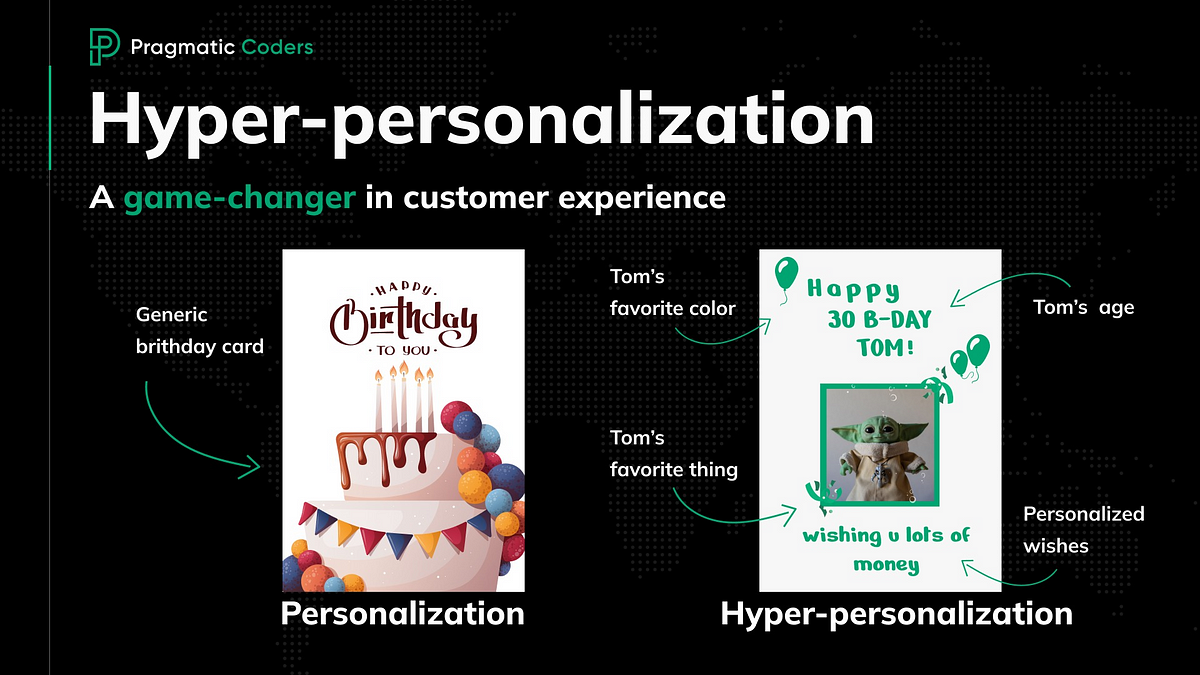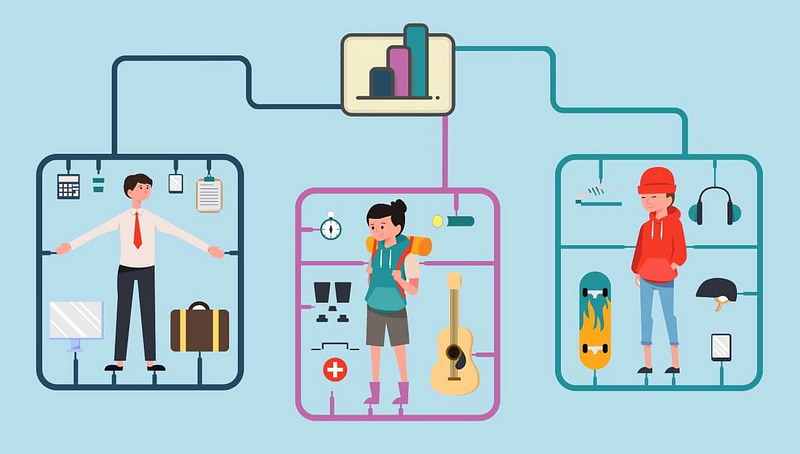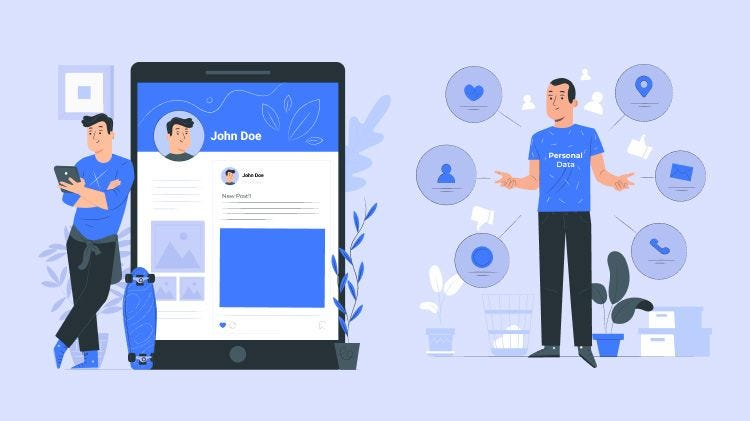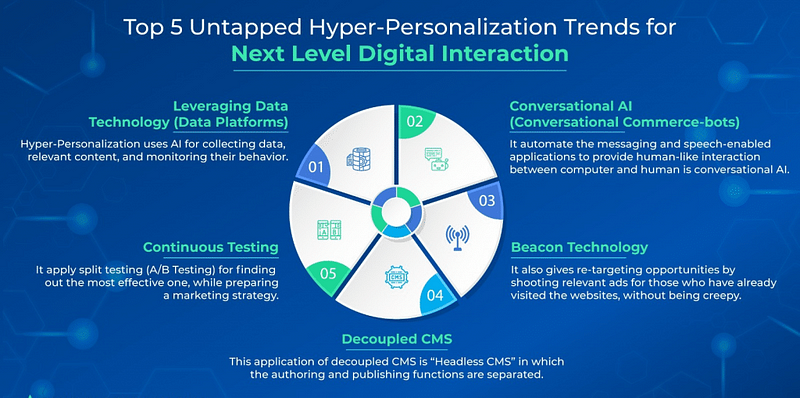In today’s hyper-competitive digital landscape, customers demand more personalized experiences than ever before. They no longer respond to generic marketing messages; instead, they seek content tailored specifically to their needs, preferences, and behaviors. Leveraging AI for Hyper-Personalized Marketing Campaigns enables marketers to create personalization that resonate deeply with individual consumers. Let’s explore how AI is revolutionizing marketing through hyper-personalization and how brands can harness this transformative technology to stay ahead.

Leveraging AI for Hyper-Personalized Marketing Campaigns
Hyper-personalization goes beyond the standard personalization of addressing customers by their first names or segmenting audiences into broad categories. It involves using AI to analyze large amounts of data — both behavioral and transactional — in real-time to create individualized experiences. With hyper-personalization, every touchpoint, from email content to product recommendations, is customized based on a customer’s past interactions, preferences, and predictive behaviors.
AI’s Role in Hyper-Personalization
- Data Analysis and Consumer Insights At the heart of hyper-personalization is data. AI, particularly machine learning (ML), excels at analyzing massive datasets at scale. AI can sift through purchase history, browsing patterns, social media interactions, and even psychographic data to uncover valuable insights about consumer behavior. Marketers can then use these insights to create personalized offers, content, and experiences. For instance, Netflix and Spotify leverage AI to recommend content based on users’ past behaviors. These platforms provide a personalized experience for every user, suggesting movies, shows, or songs that align with individual tastes. This level of customization not only increases engagement but also fosters customer loyalty.
- Predictive Analytics for Anticipating Consumer Behavior Predictive analytics is one of the most powerful ways AI is transforming marketing. By analyzing past consumer behavior, AI algorithms can predict future actions — like what products a customer is likely to purchase, what time they’re most likely to engage with an email, or even what type of messaging will resonate best. For example, e-commerce platforms use predictive analytics to recommend products that customers are more likely to purchase based on previous browsing or buying patterns. This can significantly improve conversion rates by offering customers exactly what they want, sometimes before they even know it themselves.
- Dynamic Content Generation AI can automatically generate personalized marketing content at scale. By using natural language processing (NLP) algorithms, AI tools can create email subject lines, product descriptions, and even entire marketing campaigns tailored to individual preferences. Imagine a scenario where an e-commerce brand sends out an email campaign to thousands of users, and each email has a different subject line and content depending on the recipient’s previous interactions with the website. AI-driven dynamic content generation makes this level of customization possible without manual effort.
- AI-Powered Chatbots for Enhanced Customer Interaction AI-powered chatbots have become a staple in many brands’ marketing strategies. These chatbots can handle customer queries in real-time, providing instant responses based on the specific needs and questions of the individual customer. Over time, AI chatbots learn more about user preferences, making their interactions more personalized and human-like. Beyond customer service, chatbots can be used to deliver personalized content, recommend products, and guide users through the buying journey in a highly customized way. This level of personalization enhances user experience and ensures that customers are always engaged with content that’s relevant to them.
- Personalized Ad Campaigns AI plays a significant role in programmatic advertising, where ads are purchased in real-time based on the behavior and preferences of users. AI helps brands serve the right ad, to the right person, at the right time. By analyzing user data, AI systems can optimize ad delivery, ensuring that each customer sees ads that are relevant to their interests. Take Facebook’s dynamic ads as an example. AI ensures that users see ads for products they have previously interacted with, or even items they’ve merely browsed on a retailer’s website. These personalized ads help increase the likelihood of a sale by targeting users with content tailored to their individual behaviors.

Benefits of AI-Driven Hyper-Personalization
- Improved Customer Experience Personalized marketing leads to better customer experiences. AI allows marketers to engage customers with highly relevant content, offers, and products, fostering deeper connections and brand loyalty.
- Increased Conversion Rates Targeting the right customers with the right message increases the likelihood of converting leads into customers. AI ensures that marketing efforts are optimized, reducing waste and improving the overall return on investment (ROI).
- Scalability One of the most significant advantages of AI in marketing is scalability. Manual personalization is time-consuming and often impractical at scale. AI automates the process, allowing businesses to offer personalized experiences to millions of users simultaneously.
- Real-Time Adaptation AI-driven marketing campaigns can adapt in real time. If consumer behavior changes, AI can quickly adjust the messaging or offers to reflect those changes. This flexibility ensures that marketing efforts are always relevant and effective.
Challenges in Implementing AI for Hyper-Personalization
While AI offers immense potential for hyper-personalized marketing, implementing it effectively comes with its own set of challenges:
- Data Privacy Concerns: As AI relies heavily on customer data, marketers need to be mindful of data privacy laws such as GDPR and CCPA. Striking a balance between personalization and privacy is essential.
- Complexity in Integration: Many businesses struggle with integrating AI into their existing marketing infrastructure. To fully realize AI’s benefits, companies need to invest in both technology and talent.
- Over-Personalization Risks: While personalization is key, there’s a risk of overdoing it. Brands must avoid coming across as intrusive or making assumptions that feel too personal, which could alienate customers.

Best Practices for AI-Powered Hyper-Personalization
- Leverage Data Ethically: Use customer data responsibly and ensure transparency about how it’s being collected and used. Implement robust data security measures to protect sensitive information.
- Test and Iterate: Hyper-personalization is not a one-size-fits-all approach. Continuously test different strategies, gather insights, and optimize campaigns based on real-time data.
- Focus on Customer Value: Use AI to deliver value to the customer. Whether through relevant content, timely offers, or seamless user experiences, ensure that personalization enhances the customer’s interaction with your brand.

Conclusion
AI is revolutionizing the way marketers approach personalization. With its ability to analyze data, predict behavior, and deliver customized content at scale, AI-driven hyper-personalization is helping brands create deeper connections with customers and drive better results. However, to unlock the full potential of AI, businesses need to approach it strategically, balancing personalization with privacy, and continuously evolving their tactics to stay aligned with consumer needs.
By embracing AI for hyper-personalization, brands can not only meet customer expectations but exceed them, paving the way for long-term loyalty and sustained growth.
Visit Us for more Info:
https://medium.com/@discovery.marketingezy/
www.MarketingEzy.com/blogs
Hello@marketingezy.com
